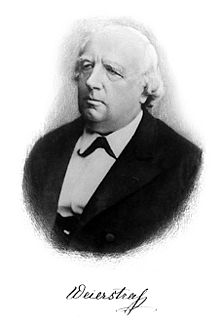Karl Weierstraß
| Karl Weierstrass | |
|---|---|

Karl Theodor Wilhelm Weierstrass (Weierstraß)
|
|
| Born |
31 October 1815 Ostenfelde, Province of Westphalia, Kingdom of Prussia |
| Died | 19 February 1897 (aged 81) Berlin, Province of Brandenburg, Kingdom of Prussia |
| Residence | Germany |
| Nationality | German |
| Fields | Mathematics |
| Institutions | Gewerbeinstitut |
| Alma mater |
University of Bonn Münster Academy |
| Academic advisors | Christoph Gudermann |
| Doctoral students |
Nikolai Bugaev Georg Cantor Georg Frobenius Lazarus Fuchs Wilhelm Killing Leo Königsberger Sofia Kovalevskaya Mathias Lerch Hans von Mangoldt Eugen Netto Adolf Piltz Carl Runge Arthur Schoenflies Friedrich Schottky Hermann Schwarz Ludwig Stickelberger Ernst Kötter |
| Known for |
Weierstrass function (ε, δ)-definition of limit Weierstrass–Erdmann condition Bolzano–Weierstrass theorem |
| Notable awards |
PhD (Hon): University of Königsberg (1854) Copley Medal (1895) |
Karl Theodor Wilhelm Weierstrass (German: Weierstraß; 31 October 1815 – 19 February 1897) was a German mathematician often cited as the "father of modern analysis". Despite leaving university without a degree, he studied mathematics and trained as a teacher, eventually teaching mathematics, physics, botany and gymnastics.
Weierstrass formalized the definition of the continuity of a function, proved the intermediate value theorem and the Bolzano–Weierstrass theorem, and used the latter to study the properties of continuous functions on closed bounded intervals.
Weierstrass was born in Ostenfelde, part of Ennigerloh, Province of Westphalia.
Weierstrass was the son of Wilhelm Weierstrass, a government official, and Theodora Vonderforst. His interest in mathematics began while he was a gymnasium student at the Theodorianum in Paderborn. He was sent to the University of Bonn upon graduation to prepare for a government position. Because his studies were to be in the fields of law, economics, and finance, he was immediately in conflict with his hopes to study mathematics. He resolved the conflict by paying little heed to his planned course of study, but continued private study in mathematics. The outcome was to leave the university without a degree. After that he studied mathematics at the Münster Academy (which was even at this time very famous for mathematics) and his father was able to obtain a place for him in a teacher training school in Münster. Later he was certified as a teacher in that city. During this period of study, Weierstrass attended the lectures of Christoph Gudermann and became interested in elliptic functions.
...
Wikipedia
